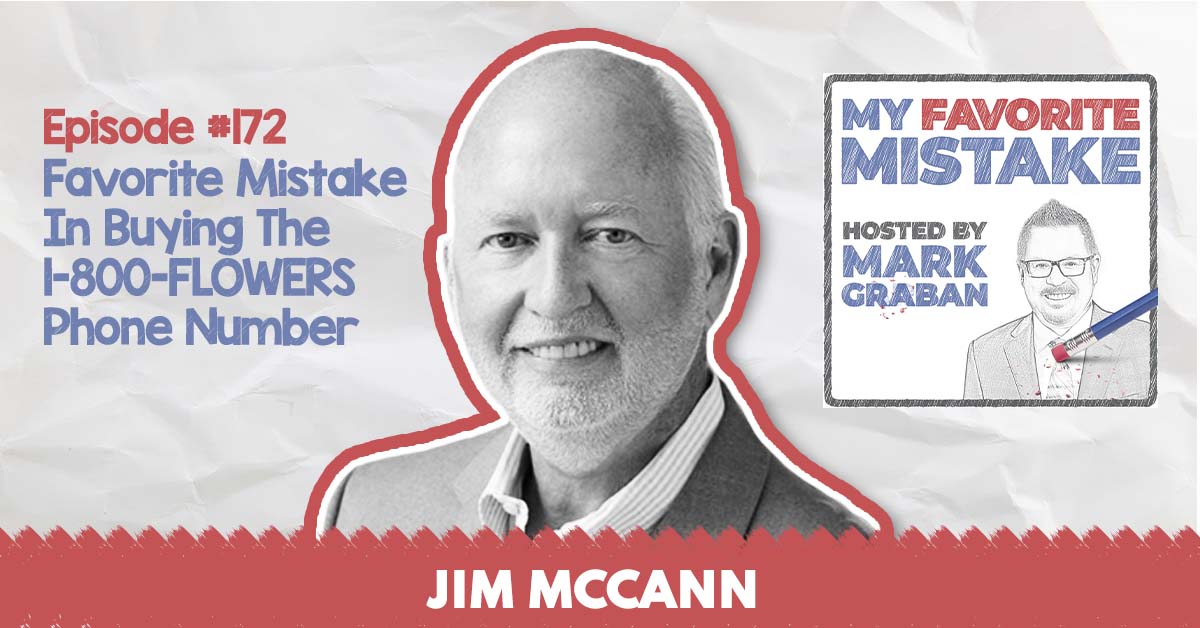Listen:
Check out all episodes on the My Favorite Mistake main page.
My guest for Episode #172 of the My Favorite Mistake podcast is Jim McCann, the founder and chairman of 1-800-FLOWERS, one of the first companies to pioneer and popularize the use of both toll-free telephone numbers and web sites to sell goods and services directly to consumers.
Jim is a highly successful entrepreneur, public speaker, and published author with titles including Talk is (Not!) Cheap: The Art of Conversation Leadership. His passion is helping people deliver smiles. Jim’s belief in the universal need for social connections and interaction led to his founding of 1-800-FLOWERS, which he has grown into the world’s leading florist and gift shop and Celebrations.com, a leading website for expert party planning content and advice.
In this episode, Jim shares his “favorite mistake” story that involves what was otherwise a very good decision — acquiring the 1-800-FLOWERS telephone number. But what was the mistake involved in buying the company that had the number assigned to it? Why couldn't he just buy the number? What mistake led to Jim taking on millions of dollars of debt from that company? How did Jim learn and apply the lesson that “being cheap” and not relying on experts can cause a lot of problems?
Questions and Topics:
- Learning to not repeat that mistake around due diligence?
- Finding the balance between saying mistakes are okay without just wildly trying things
- What the FedEx founder, Fred Smith, said to Jim that turned out to be very incorrect about shipping flowers
- Is it a mistake to spend too much time reflecting on mistakes?
- Lessons from 10-step programs, remove the shame or embarrassment from mistakes
- You were approached to be one of the first companies or bosses featured “Undercover Boss” — Turned it down 3 times — was that a mistake?
- Learning about the business? Advice for other leaders about doing this without going undercover?
- “A lot of it comes down to culture and leadership”
Find Jim on Social Media:
Watch the Full Episode:
Quotes:
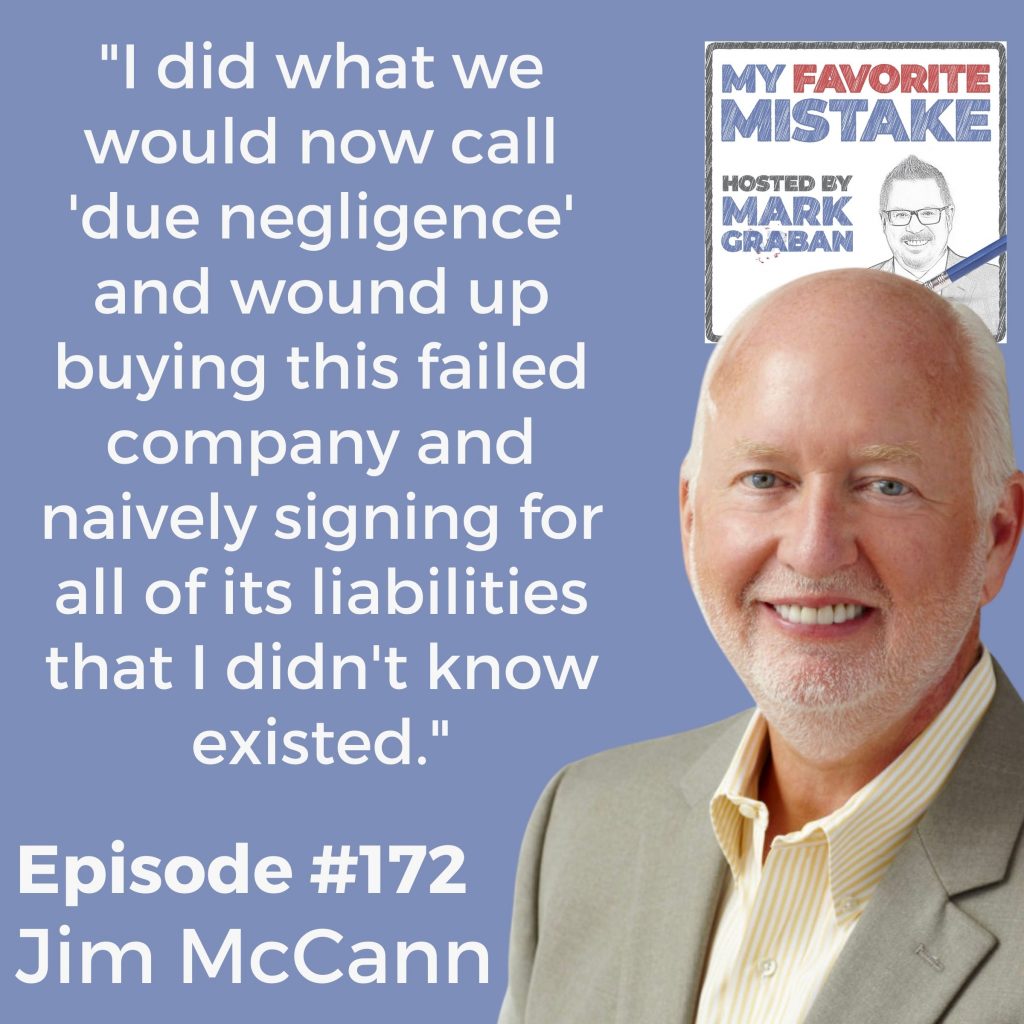
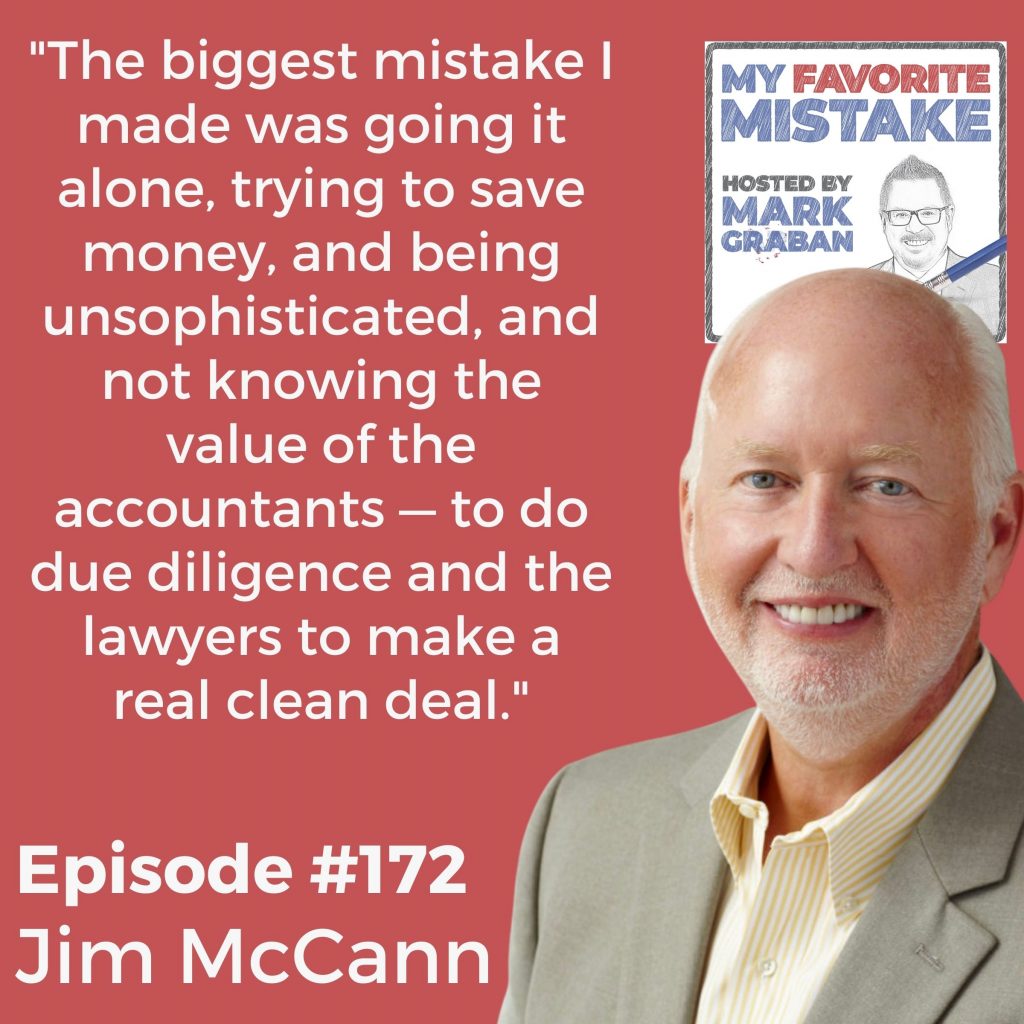
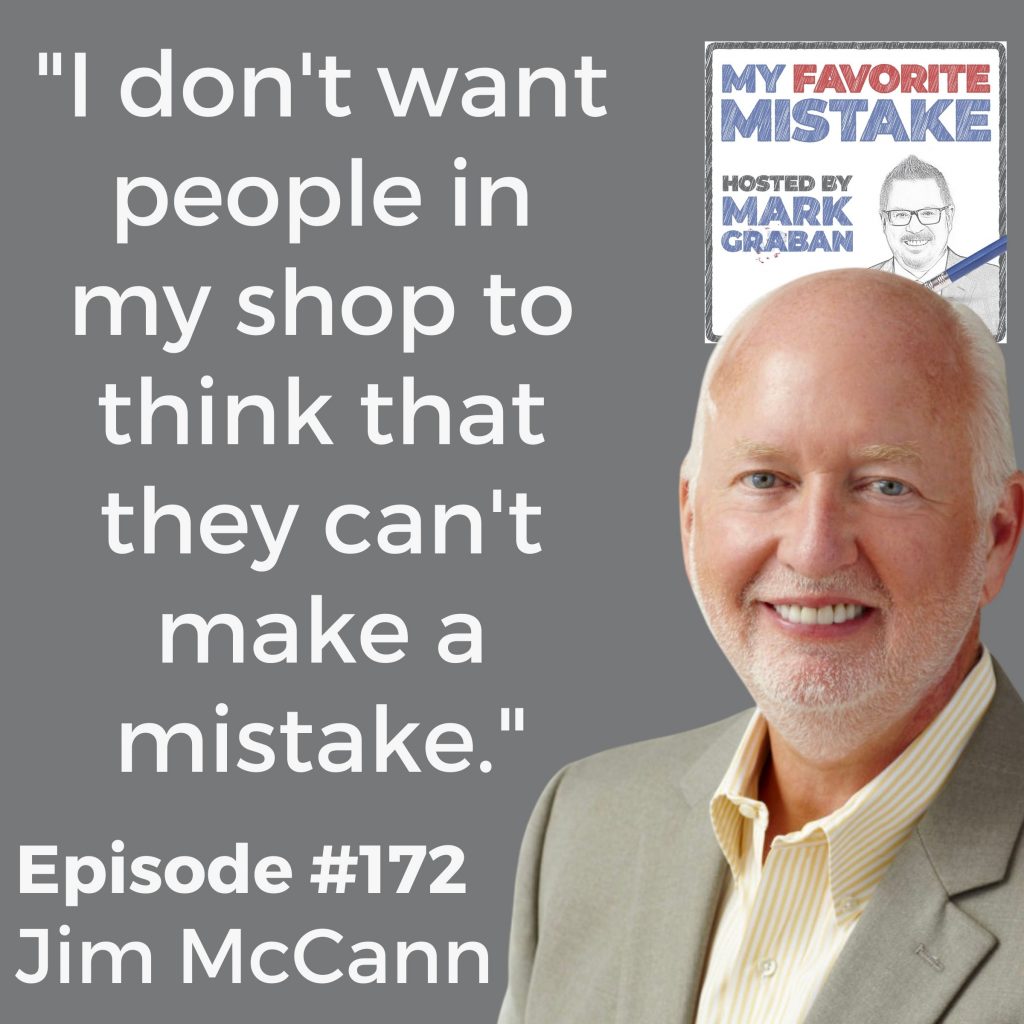
Subscribe, Follow, Support, Rate, and Review!
Please follow, rate, and review via Apple Podcasts or Podchaser or your favorite app — that helps others find this content and you'll be sure to get future episodes as they are released weekly. You can also become a financial supporter of the show through Anchor.fm.
You can now sign up to get new episodes via email, to make sure you don't miss an episode.
This podcast is part of the Lean Communicators network.

Other Ways to Subscribe or Follow — Apps & Email
Jim McCann's Favorite Mistake In Buying The 1-800-FLOWERS Phone Number
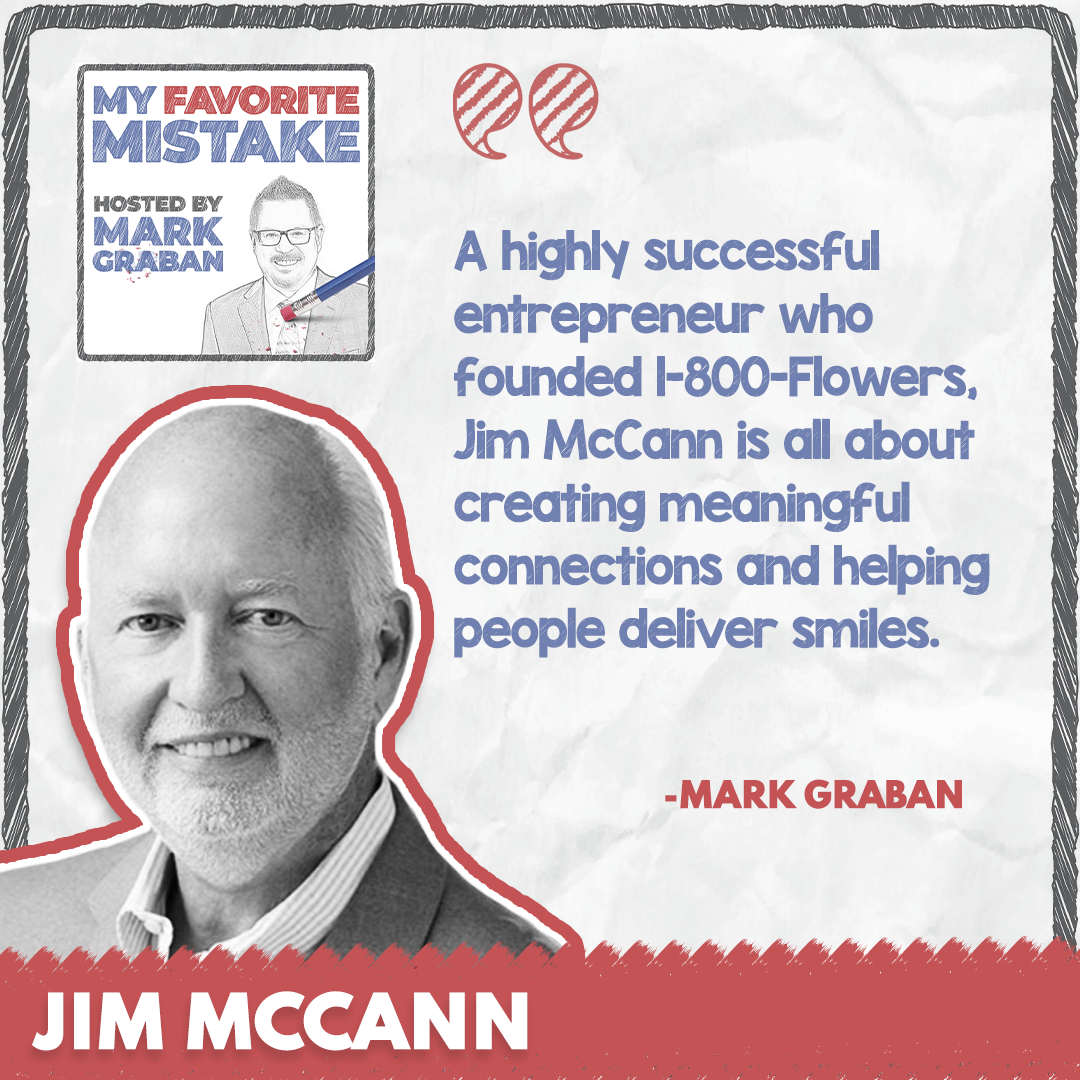
I'm excited for our guest in this episode. He is Jim McCann, the Founder, and Chairman of 1-800-FLOWERS, which was one of the first companies to pioneer and popularize the use of both toll-free phone numbers and websites to sell goods and services directly to consumers. It's a company that I'm sure most of you know. It's been around for quite a while. It is such a great success story. Before I tell you a little bit more about Jim, welcome to the show. How are you?
I’m great, Mark. It’s nice to be with you.
It’s a treat. I feel myself being nervous interviewing somebody I've seen in the commercials and recognizing your voice. I'll take a breath and make sure I'm not making a mistake by being too excited or too nervous. Jim is a highly successful entrepreneur. He's been a public speaker and a published author with books including Talk is (Not!) Cheap: The Art of Conversation Leadership. His passion is helping people deliver smiles. He and his company have done that for a long time.
His belief in the universal need for social connections and interaction led to the founding of 1-800-FLOWERS, and it's grown into the world's leading florist and gift shop. There's also Celebrations.com, a leading website for expert party planning, content, and advice. I encourage you to check out those websites and use them. Jim, there are a lot of things we can talk about from your career and the evolution of 1-800-FLOWERS. Thinking back to all of the different things that you've done and that you've gone through, what would you say is your favorite mistake?
That's different from the biggest, right? Are you going to mix it up on me?
The biggest mistake may or may not be your favorite. A favorite is big enough that it stuck with you over time.
I would've told you that the biggest mistake I've made and continue to make is spending a lot of time thinking about the mistakes I made. Those that I've spent time thinking about, the one that comes to mind, the knee-jerk are two sides to the coin. The biggest mistake I know I made was in many years into the business, I had started a company. I built it out as a retail chain. We had a bunch of stores. It dawned on me that it didn't make sense. There was no economy of scale in having a whole lot of stores without a unified backend.
I was looking around to how else we can build a big and national company. At that time, back in the mid-1980s, in '86, the 800 number was still new. This should take some explanation because young people now don't even know what you're talking about with an 800 number. I know what they are, but why are there 800 numbers? Back in those days, the new technology was 800 numbers because a long-distance telephone was expensive, and here was your chance to absorb the cost of that and allow people to call for free. It’s toll-free calling.
I thought, “All the companies that were coming out at that time were spending a fortune trying to get people to remember their 800 number. They have singing, dancing, kicklines, and every way they could to get you to remember their number.” I thought, “If you could get a number that you could dial off an alphanumeric keypad, you wouldn't have to spend all that money on memory tricks and get your name out in front of them.”
Lo and behold, I wound up buying a company that had a telephone number that corresponded with 1-800-FLOWERS. Being unsophisticated, I'm a hardworking social worker reformed to become a florist in New York. I built this chain of shops, but not very sophisticated in the ways of M&A, business, and financing those businesses. I wound up buying the company, but I'm going to save all that money on this due diligence stuff, the lawyers, bankers, and accountants. Why spend all that money?
I did what we would now call due negligence. I wound up buying this failed company and naively signing for all of its liabilities that I didn't know existed. The biggest mistake I made was going at it alone, trying to save money, being unsophisticated, and not knowing what the value was of the accountants, the due diligence, and the lawyers to make a real clean deal.
[bctt tweet=”I did what we would now call “due diligence” and wound up buying this failed company and naively signing for all of its liabilities that I didn’t know existed.” via=”no”]
I woke up in the morning. I had invested everything I had accumulated in many years of working seven days a week and building out this chain of flower shops. I spent every dollar of it and a lot more into acquiring this company just to get the 800 number. I then found out I'm $7 million now in debt on a personal liability that exceeded everything I thought I was paying for this, which was a couple of million dollars.
However, the good news is it worked. We dug out of that hole and did become a brand. We became a brand by not having money but by some good luck, some incredible good fortune, and making a lot of mistakes. We never had a lot of money left, so we couldn't make big mistakes. The biggest mistake was the inverse of the biggest success, which was finding the 800 number, and having to be forced to think more broadly, more grandly. In the next five years, we became a household name and the first real national brand in the floral business, and the rest is history still being written.
We went from retail stores to an 800 number. We changed the name of our retail stores to the 800 number, which confused the heck out of people. When the internet came along in the early '90s, my brother pushed us into the internet because we said, “If we could change this industry with no money and no real knowledge, what's the next emerging technology that would come along that would displace us?” It became clear over the next half a dozen years that the internet was big and real and going to be around. We changed our name from 1-800-FLOWERS to 1-800-FLOWERS.com. We've always been a bit paranoid about what the next technology will be, and that has served us well.
It’s because it would've been a mistake to miss any of those future trends and to think that the future was going to be forever in phone sales.
Everything is changing. You're not quite sure how, but the only thing you're certain of is things are changing and your foundation is weakening unless you're getting ready for the new foundation.
[bctt tweet=”The biggest mistake I made was going it alone, trying to save money, being unsophisticated, and not knowing the value of the accountants to do due diligence and the lawyers to make a real clean deal.” via=”no”]
How much of your business now is still through telephone sales as opposed to the internet or an app?
It is not easily separable. The answer is 90%-plus is internet, but we still have a lot of phone calls. We do a few million dollars a year in sales. Even 10% is a lot of phone traffic. When people want customer service, “I sent flowers to a friend's daughter who had a baby in the hospital.” “She's out of the hospital already. Can we reroute them someplace else?” They want to do that on the phone. They want to talk to someone who can help them. We still have lots of telephone activity.
I'd like to come back later and ask you about some of the customer service aspects of your business. Jim, I'm very grateful that you would be willing to tell that story. I'm curious. A couple of questions back to what had played out there, had you tried buying just the phone number? Was it possible to transfer that asset? Did you pursue that? Did they say, “No, you've got to buy the whole business?”
That’s essentially what happened because there was nobody in charge. It was a collection of assets, not many, but essentially, we bought the company that had the telephone number. Back then, you didn't own the telephone number. The telephone company owned it, and if it was assigned to you, you could use it. That's why we had to buy the entity with that 800 number.
The laws changed subsequently and the SEC ruled that the customer owns the number, which began a whole different industry. That's what caused MCI to be born and WorldCom. The breakup of AT&T and the existence of Verizon, all of those were a result of those telecommunication acts changing. They all had a big impact on us. At that time, you had to buy the company to get the number.
There are a couple of themes we always talk about here on the show. One is learning from the mistake. As you acquired other companies, I'm guessing you made sure you didn't repeat that mistake of trying to save money or skimp on the due diligence. Can you tell us more about that?
We're always learning, Mark. That's why people like you exist who know a lot and can bring a lot to the table to help people to know what they don't know and get better at things that they need to be better at. That's good news for you in your business. We still make mistakes, but we try not to make the same mistakes. We've done lots of acquisitions over the years, and we never did one again that allowed me to make the decision on diligence.
What about you, Mark? When you ask that question to people whether it's on your show or people in your customer base or the people you consult with, how do you counsel them in terms of what they do with that mistake? I've made a joke out of that mistake. It was painful for a long time, and that's something that we try to do. We celebrate our mistakes because otherwise, I don't want people in my shop to think that they can't make a mistake. We had a lady working for us who was very creative. She worked here for a long time. She created a wall of shame. It was three matching bookcases, and she put all of our worst ideas on that.
[bctt tweet=”I don’t want people in my shop to think that they can’t make a mistake.” via=”no”]
What I liked about that was it was funny. It was called The Wall of Shame, but it wasn't shameful. It was designed to take the shame out of it because we all have things we've done in our life that we're ashamed of. It's a powerful crippling emotion, but when you turn it into a joke or you laugh at yourself for the stupid thing you did, it helps us to compartmentalize it and give it its appropriate import if it deserves any. It tells the people around you that you can make mistakes, learn from them, try not to make the same one again, and turn them into a positive or a learning experience.
You summarized my views and what I've summarized from all the people I've interviewed and other people who have asked that same question. One thing you're touching on there is creating a culture where people can share their mistakes so that we can learn from them. A lot of that starts with the CEO. You had been in that role as Founder and CEO. If Jim McCann is willing to talk about the mistakes he's made, I'm sure that sets an example for not only the people who reported to you at the corporate level but to people all throughout the organization.
It doesn't mean that we can just do any wild and crazy thing and then say, “It was a mistake. We learned.” There's a balance. It's putting it back to you as a question like, “How do you find the balance of recognizing we're all human and we're going to try things that we thought were a good idea but turned out to be a mistake,” versus throwing stuff against the wall without thinking, analyzing, or planning. How do you find that balance whenever you're launching a new product or any employee has a new idea?
I'll put it back to you this way, Mark. There was a fellow who was a banker turned private equity and very successful. What he used to say to me frequently was to think of the best businesses or business ideas that you've come across. If you didn't laugh at them the first time you heard it, it probably wasn't bold enough. I had the occasion to see Fred Smith, the Founder of FedEx. I met Fred in 1986 when we first changed our name to 1-800-FLOWERS. We started to do business with FedEx. He reminded me when I saw him that in 1986, he said, “I don't think you can ship flowers through my system.”
Lo and behold, that year we did. We shipped quite a few flowers through the FedEx system. We had a good laugh at it in two respects. One is he laughed at the fact that he said, “This will never work,” and it's a big part of his business now. The second part of it is as my friend Steve, the private equity guy used to say. He will tell you that the first 30 or 40 people he showed the FedEx idea to laugh at it.
They thought it was ridiculous that you had to build a whole infrastructure and charge $15 for what otherwise cost $0.15 to send an envelope across the country. Everyone thought it was funny and it can't work. Steve had it right that the fear of being shamed or the fear of being bold is oftentimes the great inhibitor to great ideas and success.
Fred Smith, didn't he get a C-minus on some schoolwork where he was proposing the idea of FedEx?
He was in Harvard Business School. Maybe he's a little legend in that, but it works for me.
I was going to ask you this. One thing that's interesting as individuals and as leaders are to find the balance of thinking about mistakes enough so that we learn from them without belaboring them or beating ourselves up. I've had other guests bring up that idea of learning without making us feel bad. I'm curious when you said it's a mistake to spend too much time reflecting on mistakes. How do you decide what is too much?
It tends to calcify your ability to move and tend to, “I'll never make that mistake again.” Mark, there was a man who died a few years ago who was one of my business heroes in life. I was fortunate to get to spend some time with him over the years. His name was Wayne Huizenga. He was a remarkable guy. I'm sure you know who he was. He created five different Fortune 500 companies.
One time in a conversation, just he and me in his conference room, he said, “Jim, people like you, people like me, we make probably a lot more mistakes than other people that we know of or the people around us. However, the difference between successful entrepreneurs, people like you, me, and others is that we pick ourselves up, we dust ourselves off, and we get on with it.”
We don't spend all our time going, “I'll never make that mistake again.” He says that it paralyzes too many people. That's why he's the one who taught me to package it, make fun of it, and make it part of your lore and legend, your story. That has personal psychological benefits to it too. If you saw somebody at a party, a friend of yours, you're in your young twenties and you see that person at a party, maybe they had a beverage or two more than they should have and they do something stupid, you think it's funny because he did it, but he might be ashamed of it.
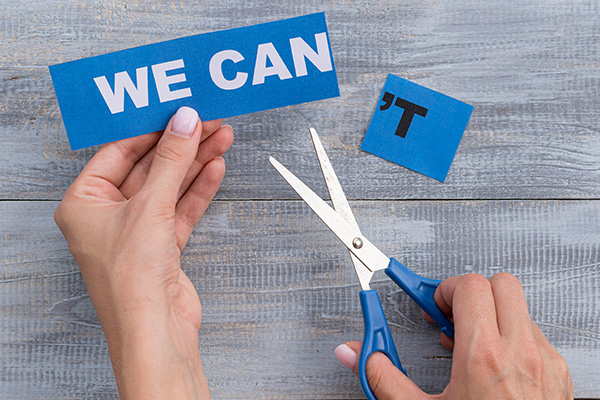
A lesson that we can teach ourselves is the thing that you feel shame about, the mistake you made, if it was somebody else, it would be funny to make it in your own mind about somebody else. Teach yourself to laugh at yourself, and that way, you package or manage your shame. It’s because shame can retard your willingness to act, to be bold, or to change. That's a dangerous thing to allow to take over.
My brother was talking about a deal we were looking at, and he said, “If they had gone public last year, they would've gone public for $600 million and we can get it for a whole lot less.” I said, “We've made a mistake back many years ago when we bought a company that was going to go public when we bought it for a lot cheaper. It went to zero.” Looking at what could have been valued is not a value. It's still painful, but I try to laugh about it.
That's great advice. Maybe that's the social worker in you thinking about how to treat yourself and how to treat others.
That's a big part of it. I learned a lot working in that world. I had some great teachers and mentors. I ran a home for teenage boys. They came from very tough circumstances. One of the things we worked on all the time was telling a story. They do it in the sober community too. It's a big part of AA where people can tell their stories and they become very good at articulating how they got to the depths and how they've recovered. We can learn some great lessons from people who have been successful in the Ten Step recovery world in terms of saying to remove the shame or the embarrassment from mistakes we've made.

That's insightful. It's great food for thought. I wanted to change directions a little bit. I have to segue to something a little bit lighter than that. My understanding is that you were approached to be one of the first bosses featured on the show Undercover Boss before it had ever aired, and you turned it down three times before saying yes. What was that mistake? Would it have been a mistake to not ever say yes to that?
It was both. It was a mistake to say no. Thank God they came back, and it was a great thing for us to do. I said no until I finally put a twist on it. A twist was this. I said, “Why don't we do it this way? My brother Chris is now the President of the company. I want him to know more and more about all of the aspects of our business in each of our brands. I'll agree that we'll do Undercover Boss, but I won't go undercover. I'll send my brother undercover so he learns the business.” They thought about it, and the people at CBS came back and said, “Okay. We like that premise,” because they said it was going to open up with a boardroom scene.
I said, “Instead of a boardroom scene, it's Chris and I and me giving him this idea and sending them out.” They said, “Okay. We haven't aired a show.” They had three in the can, but it hadn't aired yet so no one knew what it was about. They said, “Here's our ask. We want you to commit. We want to play this brother angle. We like that.” I'm ten years older than Chris so I've always been the as much older brother, “We want you to commit to go into the field and surprise him, but it has to be a genuine surprise. You can't say, ‘I'm going to tell him, and he'll act surprised.’ You have to surprise him.” I thought, “I've been torturing him my whole life. That's not out of character for me.”
They agreed to it. I agreed to it. We had a blast with it. My brother did a great job on it because he did all the heavy lifting. I went in and surprised him in two locations. One of them made it to the air. It was a wonderful experience for our whole company because everybody got involved in it. Everyone was so proud of it. CBS did an event for us. We rented an auditorium here at a local university on Long Island for the closing scene where Chris will go on stage and reveal that he did this. They sent buses. They bused 500 of our people over to this auditorium. They put on a big party for us afterward. It was a wonderful culture-building experience for us.
Everybody was so proud when it aired. I don't know if it still is, but for years, it was the most popular episode ever of that show. It's a great show, and I think it's still on the air. The reruns keep running forever. All the time, people go, “I saw your episode of Undercover Boss.” It's also on YouTube and everything now. “I saw it the other night. My kids and I watched that episode. It was so funny.” It was terrific for us as a company. Yes, it was a mistake to say no, but thank God they came back and gave me a chance to right my mistake. The way we did it was fun and clever, and it birthed Chris as a leader of this company.
What was the undercover brother surprise? Were you in disguise? He would recognize your voice.
No, he was in disguise. I wasn't. The premise was he was an out-of-work painter. My dad was a painting contractor. He worked for our dad's gigs. He was in a JOBS Program trying to learn a new skill that the state had sponsored. He was working in one of our flower shops undercover. They didn't know who he was. They knew who I was because I called and said I was coming. I walked in on him. He is nervous that I'm going to break his cover.
I'm torturing him. I'm asking the manager of the store. He is a wonderful young man. I said, “Is this guy any good?” He is telling me whispering to me off camera, “He's okay, but I'm not sure he got the skillsets for this.” They filmed us catching up in a restaurant a couple of miles away after the episode when he comes and yells at me for risking his cover.
The original no answers, was it a matter of the show being an unknown, you were too busy, or you thought there was some risk?
It sounded like a lot of work. I thought maybe it could be bad for the brand and it sounded hokey, but we all know hokey works when it's good, clean, and fun. I was too naive to realize that.
I haven't watched every episode of that show, but I've watched it enough to know the premise. It's interesting. You talked about wanting Chris to learn the business. This is the one thing I've thought about. How often the CEO feels uncomfortable or unwelcome with the frontline employees and where the work is done? I’m curious about what your broader reflections or advice for other leaders would be about getting comfortable interacting with the people who are on the phone with customers or in the flower shop putting together the orders. Is there anything that you've learned or advice you would have about that without having to go undercover?
I would tell you that because I'm a bootstrap entrepreneur and not a private equity business school-educated entrepreneur. They have skills and knowledge I've never had and still struggle to acquire, but because I'm bootstrapped, I've done every one of those jobs. I am very comfortable getting into trenches. We have about 500 people here in this office on Long Island. We have about 10,000 people overall. I'm very comfortable with any kind of people. I've been them. I've done every one of those jobs. It's certainly not as well as they do it. I'm very comfortable, and I genuinely like getting in and around.
We have a big office here. If I'm in the office, I want to do a walk about every day. Some days, I can get two in, but certainly at least one every day. I want to stop in to see people. I want to close trouble. I want to get some of the office going. Because I pick up the pulse of how things are going, I learn from people every day. I stop and interact with different teams. You learn and get a sense of what's going on and how people are feeling. They get a sense of what's important to us, and that's them. I just don't know any other way to do it, Mark. It's not something I do in terms of someone who taught me to stay connected. It's something I like to do and I'm comfortable doing it. I don't know how to do it any other way.

Jim, maybe one last question for you. You talked about people wanting to call in and get help and all the reasons we send flowers like celebrations, funerals, or high-stakes moments. I imagine there are a lot of customer service mistakes that could happen. Is there anything that you've tried to build within the company culture, maybe final thoughts about reacting to mistakes that happened with the customer calling in and how to recover from mistakes?
We've never made a mistake ever.
That's the key to your growth.
If only it were true. Customer service is a big and important piece. Frankly, it's one of the reasons why we don't have more competition because this is a tough business. Let's say you have a business with a membership model. You don't want to be in this business because it has a much higher percentage of fails than pretty much any other business.
We're not only delivering a manufactured product in a box. These are hand deliveries. These are incomplete addresses. Let's say she's a teacher, but she left early that day. She took a half day. Now it's yours. You're stuck with this package. There are a million things that can go wrong. I think it keeps the competition down because it's hard, expensive, and painful.
Listening to your question Mark, we had our customer service organization in town from all over the world. I am emphasizing this point. We got to make it right, and making it right means it doesn't matter whose fault it was. We got to make it right. Maybe the customer gave us the wrong address by mistake. It still doesn't matter. It's still our mistake. What we always tell our people on the front lines taking care of those issues and fixing them are two things. One is it's not so much what you do. It's your attitude. It's your empathy.
Secondarily, don't do enough to get by. Do enough that they want to write a letter to me, telling me how pleased they were with how you handled their situation. We keep binders. Now, it's all digital, but it used to be binders of letters I've received and my brothers received from customers telling me, “Marjorie did a terrific job. Even though she realized I made the mistake and given the wrong address, she never told me that. She said, ‘What's the address this should go to? We'll fix it. We'll get it there. Don't worry.’”
“She called back and checked and said, ‘Did your sister-in-law get it?’ ‘Yes, she did.’ ‘Is everything okay?’ ‘Yes, we're back in good standing.’” We always empathize with people. Think about behaving in such a way that the person on the other end of that phone or the other end of that text or chat function is so pleased with how you handle it that they want to come and brag about you to me.
There's one school of thought that I've heard even going back to the audio industry. I think it was the Saturn brand. Customer satisfaction was higher when there had been a problem that was resolved well. Those customers were happier than customers that never had a problem. Does that ring true to you at all?
That's true. It's an opportunity to build a relationship and engage. It's easy when everything goes right, but when something goes wrong and you struck yourself, you can earn your way into consideration of that customer in a way that is far superior and more long-lasting than if everything has just gone smoothly.
Going back, you talked about the idea of making fun of your own mistakes. I imagine then there's a different reaction that's required when it's an employee who makes a mistake. I’m curious. What are your final thoughts on helping an employee recover or bounce back the way an entrepreneur might?
From a technical point of view, we encourage people to make mistakes. I'm sure in your practice, Mark, and with working with all these different companies all over the world that you do, a lot of it comes down to culture and leadership. They are entwined. The lesson that we're still learning every day is if someone does make a mistake but with the right intention and were trying to do the right thing, make sure they know that it's okay.

Also, sharing some of your mistakes is the quickest and easiest way to do that. In our town hall meetings and our communications with people, we are oftentimes making fun of the mistakes we've made so that they feel comfortable sharing theirs. It depends on the size of the mistake. It depends on the intent. If their intention was to do the right thing and they made a mistake, it is part of our culture that they understand it's not a big deal.
Jim, I want to thank you for sharing not just your own personal story, but for talking about the leadership and the cultural elements of creating a culture where it's okay to admit mistakes and to not take them so seriously, and not make ourselves or others feel bad about that. I appreciate both the story and the insights there. I want to encourage everybody. Go to 1-800-FLOWERS.com and Celebrations.com. I know I'm going to be using your business more when I've got those opportunities to celebrate or to order flowers and gifts. Jim, this has been a real treat. You're a great guest. I appreciate you taking the time to do this.
Mark, it's been fun and great to get to know you. People who call on you to bring the lessons you've learned not only in your own life but the lessons you learned from all your clients are better for it. Another mistake that we make and have made and try not to make as much is being too cheap to call a consultant because we think, “We should be able to learn this on our own.” That's a mistake. A mistake is not turning to somebody like you who's made a career and a practice out of learning best practices and bringing them to the table because you can help them to accelerate a learning element. Sometimes, the biggest mistake is not making that call.
It’s very kind of you to add one final reflection here. It's kind of you to join me and your team to help me out. I made a number of mistakes in my initial emails. I don't know if this ever got to you, Jim, where I was going back and forth and put the wrong date in the email. I was pretty embarrassed. I'm glad that you were still able to come to do the interview. I was afraid they were going to say, “Jim, this guy's a flake. He makes mistakes. I don't know if this is a good idea.”
As they say in the old country, it doesn't matter.
Again, Jim McCann of 1-800-FLOWERS, thank you for that. Thanks for being a good guest.
Thanks, Mark. Have a great day.
Thanks a lot to Jim McCann. I want to thank you for reading. I hope this show inspires you to reflect on your own mistakes, and how you can learn from them or turn them into a positive. I've had readers tell me they started being more open and honest about mistakes in their work, and they're trying to create a workplace culture where it's safe to speak up about problems. It’s because that leads to more improvement and better business results. If you have feedback or a story to share, you can email me at MyFavoriteMistakePodcast@gmail.com.
Important Links
- 1-800-FLOWERS
- Talk is (Not!) Cheap: The Art of Conversation Leadership
- Celebrations.com
- MyFavoriteMistakePodcast@gmail.com
- https://Anchor.fm/favorite-mistake/support

